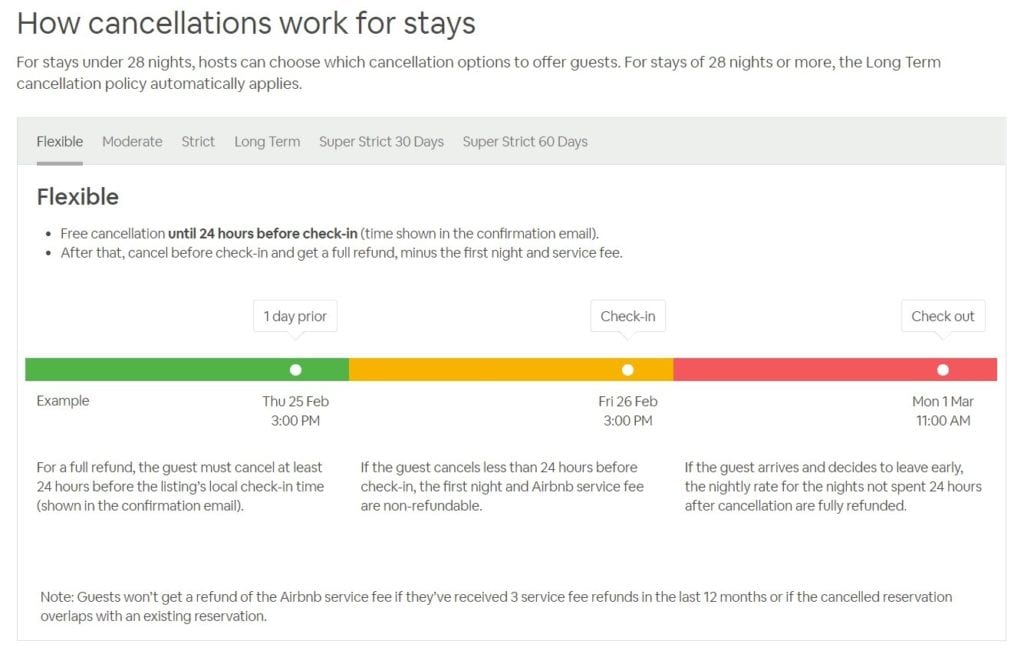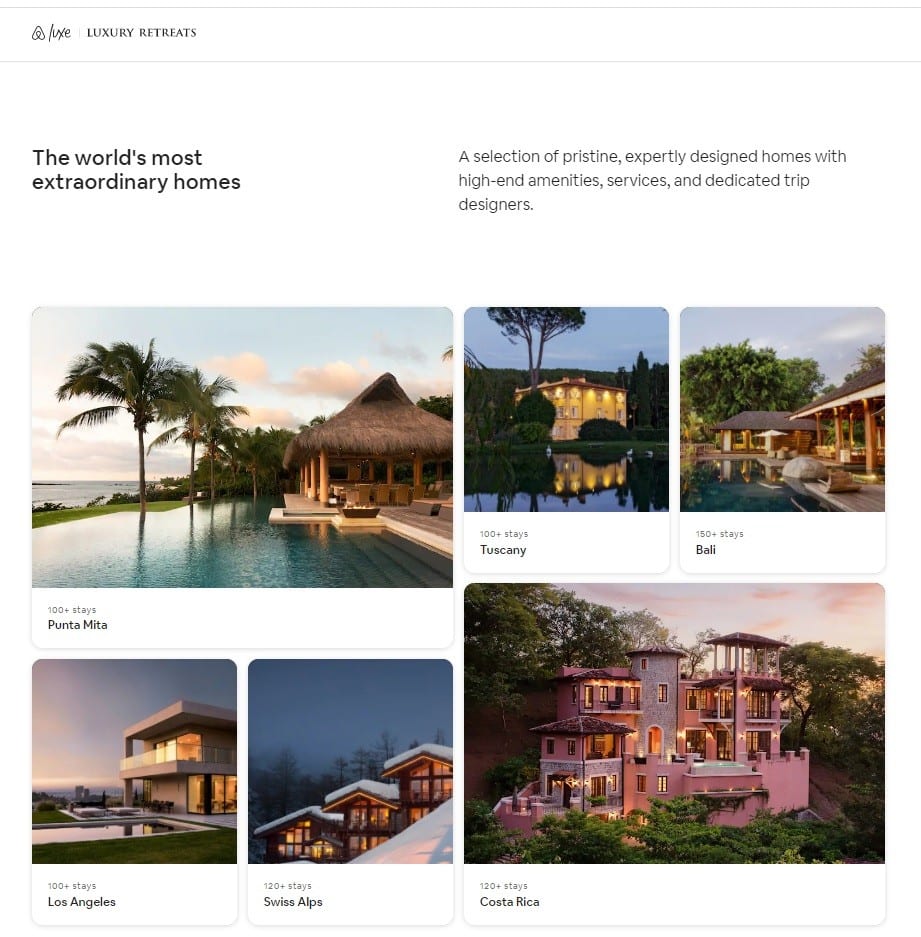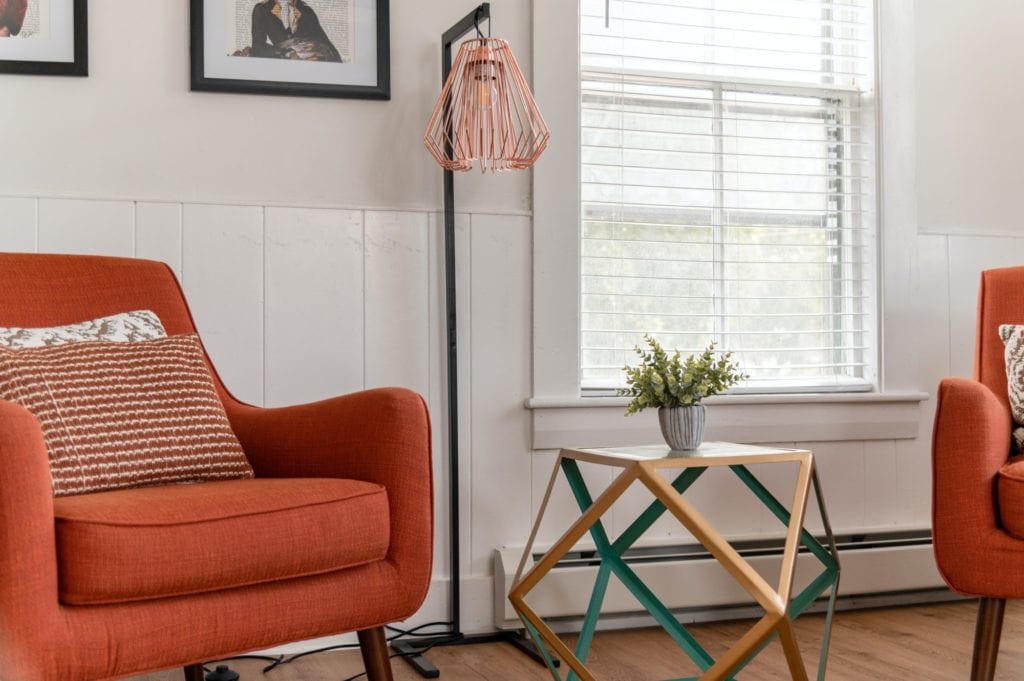Airbnb might be great for getting bookings to your rental – but what happens to you, the host, when a guest cancels their stay?
The site offers a range of different cancellation policies – each with different rules about when a guest can cancel and how much you are required to refund them when or if they do.
It can be overwhelming to know which option will offer you the best deal, while also attracting the greatest number of great bookings.
Today, I’ll walk you through what happens to you as a host when guests cancel their bookings, and how to make sure you never get a penalty that you don’t deserve.
Table of Contents
Airbnb guest cancellations
During turbulent times like this, ensuring that you choose the cancellation policy that works best for you, and which you understand 100%, is paramount.
In fact, when the Covid-19 crisis first hit, hosts the world over were left out-of-pocket. Some even went bankrupt overnight, after guests cancelled in droves. Owners were unable to secure refunds; caught out by surprises in their cancellation policy and Airbnb’s strict rules.
A survey in summer 2020 by investment company IPX 1031 (published by business magazine Forbes) surveyed part-time and full-time Airbnb hosts, plus guests who have used the platform, in the US.
The poll found that at least 64% of guests had either cancelled or planned to cancel a booking due to the pandemic.
On average, by summer 2020, hosts had already lost the equivalent of US $4,036 (around £2,871) since Covid-19 began to spread in the US, and at the time, 16% had already been forced to miss or delay a mortgage payment on their properties as a result. Today, the losses are likely higher still.
As if we didn’t already know: cancellations cost.
Of course, as a business owner, it’s important to keep your guests happy. You want to offer enough of a cancellation policy to give them the confidence to book without fear, especially during uncertain times.
All guests want to know they can cancel if they really need to – after all, if Covid has taught us anything, it’s that we never know what the future might hold.
But serious, high-quality guests will understand that you’re running a business and will be just as hesitant as you about cancelling plans unnecessarily, especially when travel starts back up again.
So, finding the right cancellation policy is all about balance for everyone involved.
So what to do?
I’ve listed the different Airbnb policies and what happens to the host if a guest decides to cancel, so you can make the best choice for you and your rental.
At Boostly, we also consider how you can avoid relying on the platform altogether, keeping more control of your own bookings, cancellation policy, and ultimately, the revenue in your pocket – see below for way more on that.
Why be dependent on OTAs like Airbnb and Booking.com? Did you know you can save thousands on commission fees by getting direct bookings? Get our free blueprint on how to double direct bookings for free.

Airbnb cancellation policy - guest refunds and the rights of the host
Flexible
- Guests can cancel anytime up to 24 hours before check-in.
- If the guest cancels at least 24 hours before check-in, they will get a full refund and the host will not get paid.
- If the guest cancels within 24 hours of check-in, the host will be paid for every night the guest ends up staying (if any), plus one extra night.
Pros
- Favoured by Airbnb and may lead to your listing appearing higher in the search results.
- May mean your guests see you as a “friendly host” if you elect not to offer the flexible cancellation policy.
Cons
- The most flexible cancellation policy for the guest, with the least protection for the host.
- Could attract less-than-serious guests who are more likely to cancel at the last minute.
- Could leave you with empty rentals if guests cancel at short notice, giving you no time to find replacement guests.
Moderate
- Guests can cancel and receive a full refund up to five days before check-in time. This means you won’t get paid at all in this case.
- If the guest cancels within five days of check-in, you’ll get paid for every night they stay (if at all), plus one extra night, plus 50% for all the unspent nights.
Pros
- A good balance between the needs of the guest and the host.
- Likely to attract guests who are more serious, and attract fewer cancellations.
- Likely to give you at least five days to find replacement guests
Cons
- Your listing will not be as popular in Airbnb search results (but there are no major) penalties.
- You may attract fewer bookings than listings with a Flexible policy if you’re only relying on Airbnb to get bookings.
Strict
- The strictest cancellation policy available for most short-term rental Airbnb hosts.
- Least flexible option for guests.
- Guests can only cancel with a full refund – meaning no payment for you – in the 48 hours immediately after booking, and only if this is at least 14 days before check-in.
- If guests cancel later than that, at least seven days before check-in, you will receive 50% of the total payment.
- If guests cancel within seven days of check-in, you will receive 100% payment.
Pros
- You receive the highest payouts in case of cancellation within the terms.
- You are unlikely to have empty blocks on your calendar as guests must give more notice and must cancel within hours of booking to get a full refund.
- Likely to attract very serious guests who are less inclined to cancel.
Cons
- A strict cancellation policy can cause your listing to appear lower in Airbnb search results.
- You may also attract fewer bookings because guests are wary of the policy.
Long term
- Applies to all stays of 28 days or longer.
- Overrides your existing cancellation policy for stays of that time.
- Guests can only cancel with a full refund – meaning no payment for you – in the 48 hours immediately after booking, and only if this is at least 28 days before check-in.
- If the guest cancels after that, you will get 100% payment for all nights spent, plus for 30 additional nights.
- If there is a cancellation with fewer than 30 days left on the guest’s reservation at the time, you will be paid for 100% of all remaining nights on their booking.
Pros
- Pretty strict on timings, meaning a payout is more likely for you.
- More likely to give you much more time to find a replacement guest if needed.
Cons
- You may attract fewer long-term bookings via the Airbnb platform because guests are wary of the policy.
Super Strict 30 Days
- Only available to experienced hosts by invitation only.
- If the guest cancels at least 30 days before check-in, you receive 50% of the payout.
- If the guest cancels within 30 days of check-in, you receive 100% of the payout.
- If the guest cancels after check-in, you also receive 100% of the payout.
Pros
- Likely to attract very serious guests who are less inclined to cancel.
- Generous payout policy in the event of a cancellation.
- More likely to give you more time to find a replacement guest if needed.
Cons
- You may attract fewer bookings via the Airbnb platform because guests are wary of the policy.
Super Strict 60 Days
- Only available to experienced hosts by invitation only.
- If the guest cancels at least 60 days before check-in, you receive 50% of the payout.
- If the guest cancels within 60 days of check-in, you receive 100% of the payout.
- If the guest cancels after check-in, you also receive 100% of the payout.
Pros
- Will attract very serious guests who are unlikely to cancel.
- Generous payout policy in the event of a cancellation.
- More likely to give you much more time to find a replacement guest if needed.
Cons
- You may attract even fewer bookings via the Airbnb platform because guests are wary of this severe policy.

Airbnb Luxe cancellation policy for guests
Airbnb Luxe properties have their own terms and conditions for both hosts and guests, including for cancellation and refunds.
- This policy solely applies to bookings on the Airbnb Platform that are managed by Luxury Retreats and have the official “Luxe” or “Luxe Bookings” label.
- Guests can cancel after check-in due to any “travel issue” as defined by Airbnb, which can include problems such as the actual accommodation not appearing to live up to the promises of the listing.
- Guests need to report the issue to Airbnb “within a reasonable time period” of finding the problem. They may need to provide photo evidence of anything they report.
- If their issue is found to be valid, guests will either receive a 100% refund or comparable accommodation by Airbnb free of charge for their remaining nights.
- Their issue may not be considered valid if they report it after leaving the property, or if they are found to have caused it in any way.
Airbnb guest cancellation - What other penalties can apply?
Hosts do not receive any of the cleaning service fees if your guest cancels before check-in, at any time, for any policy. After all, no cleaning fee needs to be paid if no cleaning is required in the event of a cancellation.
Hosts’ cancellation policy can also be declared void by Airbnb, with the guest possibly entitled to a full refund, under Airbnb’s Terms of Service, in the following cases:
- If the listing is inaccessible, unclean, unsafe, or there’s an animal in the listing that wasn’t declared.
- If a guest can’t reach you, or you decline to fix a serious issue reported to you by the guest, and the guest contacts Airbnb within 24 hours of finding the issue.
- If a guest needs to cancel because of an “extenuating circumstance”. This could be because of a natural disaster or other emergencies that prevent guests from safely travelling.
Cancellations by guests do not normally affect hosts’ Superhost status. In contrast, your Superhost status is at risk if you, as a host, cancel a booking that is not covered by the Extenuating Circumstances policies.

My Airbnb guest wants to cancel despite my cancellation policy - can they?
Airbnb has its own “Extenuating Circumstances Policy”, which sets out its rules for cancellation that “control and take precedence over the reservation’s cancellation policy”.
In the event of extenuating circumstances, guests can cancel and receive a cash refund, credit on their account, and something Airbnb calls “other consideration”.
Guests must normally show Airbnb proof and/or documentation of these circumstances to qualify for a refund.
The circumstances are:
- Changes to government travel requirements. This includes unexpected changes to visa or passport requirements imposed by a government or travel agency. This doesn’t include lost or expired travel documents or personal blocks on travel to the guest.
- Emergencies and epidemics as declared by governments. Does not include diseases that are a well-known and common risk in an area, such as malaria in Thailand or dengue fever in Hawaii.
- Government travel restrictions that are imposed by a governmental agency that prevent or prohibit travelling to, staying at, or returning from the Listing location. Does not include government “guidance” or “non-binding” rules.
- Military actions and/or hostilities. Acts of war, hostilities, invasions, civil war, terrorism, explosions, bombings, rebellions, riots, insurrection, civil disorder, and civil unrest.
- Natural disasters, such as massive outages of essential utilities, volcanic eruptions, tsunamis, and other severe and abnormal weather events. Does not include common or foreseeable weather in the location, such as “hurricanes occurring during hurricane season in Florida”.
Airbnb also has a specific Covid-19 Extenuating Circumstances Policy (although most of it is unlikely to apply to bookings made now and in future).
It lays out cancellation options for guests, for bookings made on or before March 14, 2020, and only if the check-in date has not passed.
In contrast, for bookings made after this date, it states: “The host’s cancellation policy will apply as usual to reservations made after 14 March 2020…except where the guest or host is currently sick with Covid-19”. It then urges guests to “carefully review the host's cancellation policy when booking and consider choosing an option that provides flexibility”.
From all hosts everywhere: let us say… cheers, Airbnb!

Airbnb cancellations guest refund policy - Your money in their hands
It’s clear: as the uncertainty around the pandemic continues, making sure you have the best cancellation policy for your business has never been more important.
But as this list shows, Airbnb holds all your cards (or should that be keys?!) when it comes to cancellations. And it can be confusing to know exactly what the cancellation policy ties you to if the worst happens.
As shown in its Extenuating Circumstances policies, Airbnb can also change its rules at any time, with no notice or reasoning given.
Similar to many online platforms dealing with the public, Airbnb is – perhaps understandably, but no-less-frustratingly! – utterly desperate to make a good impression on users, often at the expense of the host, as this shows.
This means that policies tend to favour the guest, especially in the event of unexpected circumstances that are no fault of the host.
As one anonymous host wrote on the aptly-named website AirbnbHell.com, on March 18, 2020: “Airbnb has overridden [my] host cancellation policies in response to the Coronavirus outbreak. This allows guests to cancel at any time without any penalty and without any justification.”
“I have just had a cancellation for £2,500 (US $3,520) with just three days’ notice and there is nothing I can do about it. I was not consulted and the guest did not have to provide any proof or justification about the virus... Airbnb does not care about their hosts. They bite the hand that feeds them.”
Airbnb can also choose to withhold payments and allow cancellations for tenuous reasons. It has also been known to submit guests to rigid and faceless booking policies and often-obtuse customer service.
When your entire rental business is reliant on OTAs such as Airbnb, you’re literally putting your money and livelihood in their hands – and risking unhappy guests, too (its customer service is infamous among both hosts and guests, remember!).
That’s why at Boostly, we always recommend that serious short term rental owners set up their own website with an option for direct booking.
This allows you to take back control into your own hands, and build real relationships with the people who book your place. You can also set your own rules for cancellations, refunds, and customer service.

Personalised and powerful: Why you need direct bookings
When a guest books through your direct website, you are immediately entering into a more personal, human-scale relationship. This is especially true if things go wrong.
Even if much of the booking, check-in information, and other admin is automated, booking directly with you means that you can tailor your booking process to their needs.
Guests are far more likely to be able to contact you directly, without someone else’s awkward policies or “Help Centre” getting in the way.
Without your own website and direct booking policy, you’re stuck relying on faceless giants such as Airbnb and similar platforms – to the literal expense of hosts like you that make the business possible in the first place. You have no control over what happens if a guest decides to cancel.
But the more personal a relationship you can build with the guest – without a major behemoth like Airbnb getting in the way – the more you can communicate with them directly and on a human level, and the less likely they will be to bail on their booking in the first place.
Then, even if your guests do end up having to cancel, this time it's you that holds all the cards.
You can work out a cancellation policy that works for you and the guest; is personalised to the particular situation, and keeps your customers happy and loyal without leaving you completely out-of-pocket.
Platforms such as ours at Boostly can help rental operators like you figure out exactly how to do this. We can help even if you’re not an expert in tech, sales, social media, or marketing; and even if you’ve always relied on Airbnb for your business before.

We're the leading educator for short-term rental operators, with a seriously-engaged social media community and a range of business services that help rental operators big and small to gain freedom from OTAs such as Airbnb, empowering them to set up direct bookings.
I first created Boostly in 2016, because as a host, I was pissed off with the power of the OTAs and how they treat us. They look at us as a number. But instead of standing on my soapbox and complaining, I decided to do something different.
That’s why we help you with everything from setting up a website via a done-for-you service, to creating content and engaging social media posts, and can even help you to write emails to your email list – all so you attract and lead your perfect guests to book directly with you, no OTA required.
Airbnb has taken over the market, but it doesn’t have to control your business. Deciding to opt-out of dependence on OTAs, with the support and encouragement of a great community and highly-powerful online tools available through Boostly, might just be the alternative you’re looking for.
So not only do you know what happens to you if a booking falls through, you’re actually deciding the rules in the first place – keeping guests happy, increasing repeat custom, building strong guest relationships, and improving customer service.
Happily, all this is likely to decrease your cancellation rate in the process. Win, win, win.
Why be dependent on OTAs like Airbnb and Booking.com? Did you know you can save thousands on commission fees by getting direct bookings? Get our free blueprint on how to double direct bookings for free


